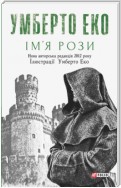Umberto Eco

Umberto Eco Knight Grand Cross (born 5 January 1932) is an Italian semiotician, essayist, philosopher, literary critic, and novelist. He is best known for his groundbreaking 1980 novel Il nome della rosa (The Name of the Rose), an intellectual mystery combining semiotics in fiction, biblical analysis, medieval studies and literary theory. He has since written further novels, including Il pendolo di Foucault (Foucault's Pendulum) and L'isola del giorno prima (The Island of the Day Before). His most recent novel Il cimitero di Praga (The Prague Cemetery), released in 2010, was a best-seller.
Eco has also written academic texts, children's books and many essays. He is founder of the Dipartimento di Comunicazione at the University of the Republic of San Marino, President of the Scuola Superiore di Studi Umanistici, University of Bologna, member of the Accademia dei Lincei (since November 2010) and an Honorary Fellow of Kellogg College, University of Oxford.
Eco was born in the city of Alessandria in the region of Piedmont in northern Italy. His father, Giulio, was an accountant before the government called upon him to serve in three wars. During World War II, Umberto and his mother, Giovanna, moved to a small village in the Piedmontese mountainside. Eco received a Salesian education, and he has made references to the order and its founder in his works and interviews. His family name is supposedly an acronym of ex caelis oblatus (Latin: a gift from the heavens), which was given to his grandfather (a foundling) by a city official.
His father was the son of a family with thirteen children, and urged Umberto to become a lawyer, but he entered the University of Turin in order to take up medieval philosophy and literature, writing his thesis on Thomas Aquinas and earning his Laurea in philosophy in 1954. During his university studies, Eco stopped believing in God and left the Roman Catholic Church. After this, Eco worked as a cultural editor for the state broadcasting station Radiotelevisione Italiana (RAI) and also lectured at the University of Turin (1956–1964). A group of avant-garde artists, painters, musicians, writers, whom he had befriended at RAI (Gruppo 63), became an important and influential component in Eco's future writing career. This was especially true after the publication of his first book in 1956, Il problema estetico in San Tommaso, which was an extension of his doctoral thesis. This also marked the beginning of his lecturing career at his alma mater.
In September 1962, he married Renate Ramge, a German art teacher with whom he has a son and a daughter. He divides his time between an apartment in Milan and a vacation house near Urbino. He has a 30,000 volume library in the former and a 20,000 volume library in the latter. In 1992–1993 Eco was the Norton professor at Harvard University. On May 8, 1993, Eco received an honorary Doctor of Humane Letters from Indiana University at Bloomington in recognition of his over 15 year association with the university's Research Center for Language and Semiotic Studies. Six books that were authored, coauthored, or coedited by Eco were published by the Indiana University Press. Additionally, he frequently collaborated with his friend, Dr. Thomas A. Sebeok, noted semiotician and Distinguished Professor of Linguistics at IU. On May 23, 2002, Eco received an honorary Doctor of Letters from Rutgers University in New Brunswick, New Jersey. In 2009, the University of Belgrade (Serbia) awarded him an honorary doctorate. Eco is a member of the Italian skeptic organization CICAP.
 čeština
čeština Deutsch
Deutsch français
français magyar
magyar polski
polski русский
русский English
English Azərbaycan
Azərbaycan беларуская
беларуская italiano
italiano ქართული
ქართული қазақ
қазақ Nederlands
Nederlands português
português slovenčina
slovenčina español
español 中文
中文 українська
українська








